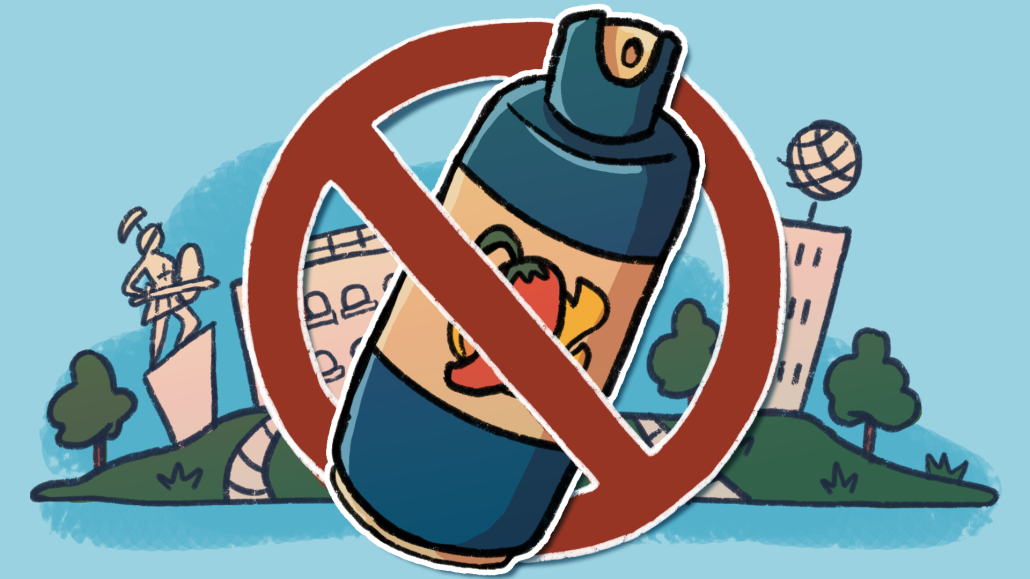Letter to the Editor: USC must reverse its ban on pepper spray immediately

Dear President Folt:
Although I am proud to be a Trojan and grateful for the positive changes you have brought to the university, there are undoubtedly many areas still open for improvement at USC. I am writing to you and the readers of the Daily Trojan to express my concern about the active ban of pepper spray on campus.
In 2017, former USC Public Information Officer and current Interim Chief of the Department of Public Safety David Carlisle told reporters at Annenberg Media, “The University has a no weapons policy and that includes pepper spray … Pepper spray is generally considered a defensive weapon, which is also prohibited on campus.” This policy differs significantly from other schools in surrounding areas, such as UCLA and Pepperdine, which both allow students to carry pepper spray as a self-defense mechanism in compliance with California law.
As in many big cities, students and residents in Los Angeles are at high risk of encountering crime. Homicide rates hit a decade-long high in 2021 and vehicle thefts, robberies and property crime have also spiked over the last few years. However, on campus, students have the additional fear of experiencing another heinous act of violence: sexual assault.
In the past, you have expressed anger towards sexual violence at USC and compassion for victims, specifically in response to the Sigma Nu sexual assault allegations and the abuse inflicted by former Student Health physican Dr. George Tyndall. You were right in stating that these events have been devastating for our community. Provost Charles Zukoski also issued a heartfelt letter to USC faculty expressing sincere empathy for my peers who have been impacted by sexual assault at USC, calling it “abhorrent criminal behavior that is unacceptable at our university.” As a former Greek Life member and a former student-athlete, I deeply appreciate the administration’s stance and the efforts you have made thus far to combat sexual assault on campus. However, students need to be given access to tangible resources in order to break the perpetual cycle of vicious assault in our community.
Unfortunately, currently implemented prevention tactics for sexual assault, such as mandated workshop training and supportive hotlines, are ineffective. As you know, cases of sexual assault at USC are disproportionately high compared to other universities. At USC, 1 in 3 women will be assaulted, as opposed to the national average of 1 in 4. I acknowledge that the issue of sexual assault on campus is complex, and there is no single solution we can pursue. However, USC is one of the few universities to place a ban on self-defense weapons that could give students the opportunity to defend themselves and potentially deter sexual assault.
While the USC community values the transparency offered by Department of Public Safety Crime Alerts and Annual Safety Reports, the reality is that the number of sex-related crimes occurring on and near campus is unsettling. In the 2021 Annual Security and Fire Safety Report released by USC, there were a total of 32 sex offenses reported in 2017, 203 offenses in 2018, 86 offenses in 2019, and 37 offenses in 2020 (when most students were only on campus for about two months of the calendar year). In addition to sexual assault, aggravated assault reportedly occurred 21 times in 2017, 25 times in 2018, 26 times in 2019 and 17 times in 2020.
All universities have a legal obligation to protect students from foreseeable crime, as determined by Stanton v. University of Maine System, Mullins v. Pine Manor College, The Clery Act, amended by The Federal Campus Sexual Assualt Victim’s Bill of Rights, and more. In essence, these cases decided that because of the frequency of occurrence, sexual assault is a foreseeable crime on campuses, and universities must be transparent when it comes to reporting crime-related data. By banning pepper spray, USC is not only neglecting its duty to protect its students but also perpetuating the attitude that sexual assault is something that “just happens.” Lifting the ban is one step away from complacency.
A pro-pepper spray policy could lower the risk of sexual assault and protect students from falling victim to other types of crimes, such as robbery and battery, even if the students are not formally trained on the use of pepper spray. It is immediately incapacitating, allowing defenders to ward off attackers, but the short-term effects wear off in time, making it a safe defensive weapon for students to carry on campus, as there are incredibly rare instances in which pepper spray has been lethal. Some also believe that encouraging students to carry pepper spray for defensive purposes could inspire those with malicious intentions to bring pepper spray on campus. A person who wishes to attack students with pepper spray or any other weapon will not be deterred by a universal ban; however, they may be deterred knowing that students have self-defense tools on them at all times.
It is past time that our university implement action to stop sexual assualt on campus. Please consider lifting the ban on pepper spray and working with Interim DPS Chief Carlisle to actively encourage students to carry pepper spray at all times before classes begin on Aug. 22.
Sincerely,
Molly Davis
B.A. Public Relations
University of Southern California ‘24

